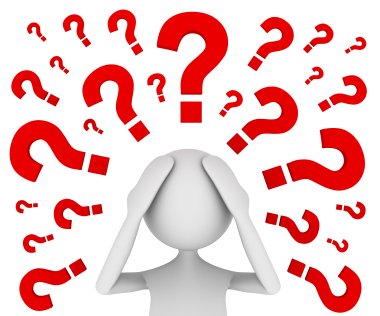
Do you sometimes feel anxious or uneasy? A persistent feeling of anxiety can sometimes stem from mental conflict brought about by trying to resolve two or more contradictory ideas. You might not even be aware of the cause, but if the confusion is not resolved it will continue to lurk in your subconscious and prolong the feeling of discomfort.
For example, a person might think, “I want to spend the day with my best friend instead of visiting my nasty uncle.” But, at the same time, she says to herself, “I shouldn’t think only of me; maybe I should think of him first, even if he treats me poorly.” Since the two ideas are incompatible, she’s confused over what to do. One of two things will happen: Either she will spend the day with her best friend, all the while feeling guilty for being “selfish,” or she’ll spend the day being unhappy with her uncle, while feeling resentful and annoyed. No matter what she does, her confusion remains unresolved.
She cannot truly relax until she identifies and resolves this emotional conflict. She’ll end up cranky, perhaps even taking her frustration out on anybody unfortunate enough to be around her. Indeed, serious and persistent contradictions can lead to psychological problems such as anxiety disorder, hopelessness and even outright depression.
But it doesn’t have to be that way. Confusion is a signal from your mind that you’re wishing for two things that don’t go together. At first it’s disappointing to finally face up to the contradictions that are creating your confusion — especially if you really wanted to have it both ways. But the truth will indeed set you free. Identify the things about which you’re confused, accept what you cannot change, and the problem will fade away.
There are so many everyday examples. “I want to be excellent at my work, earn good money and lots of success – but I (also) want to take it easy, doing only what I have to do.” Or, “I want to move to the Midwest to be near my girlfriend – but, I want to live close to New York or L.A.” These kinds of conflicts happen every day. Of course, it’s natural to want lots of different things, but the problems arise when some of these things conflict with one another. With a little self-awareness (and a willingness to recognize that, as grown-ups, we have to make choices), the anxiety and discomfort will disappear.
Good mental health starts with identifying and correcting contradictions that we don’t realize we’re holding on to. It’s not as easy as just popping a pill, but it’s way more effective. You have an excellent chance of uncovering the real causes of your emotional problems by analyzing and identifying your thoughts and feelings. The dubious alternative of relying on the inexact science of medication rarely does anything more than address the symptoms. An effective dose of Prozac or Paxil (along with the often unhappy side effects) can dull your senses enough that you can pretend that the contradictions don’t exist. But they haven’t gone anywhere. And even when psychiatric medications seem to work, they usually don’t maintain their effectiveness over the long run. Living with contradictions, day in and day out, has to catch up with you sooner or later — pills or no pills.
On the surface, it may look effortless, but good mental health and genuine happiness mean making hard choices. The simple fact is that you sometimes cannot have your proverbial cake and eat it too. Resolve your conflicting thoughts and desires and grant yourself the freedom to genuinely enjoy whatever path you choose. And the reduction in stress is well worth the effort! No guilt. No resentment. No nagging doubts. Just liberation and an end to anxiety.
Follow Dr. Hurd on Facebook. Search under “Michael Hurd” (Rehoboth Beach DE). Get up-to-the-minute postings, recommended articles and links, and engage in back-and-forth discussion with Dr. Hurd on topics of interest. Also follow Dr. Hurd on Twitter at @MichaelJHurd1
